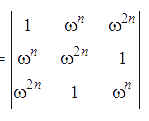If 1.ω,ω2 are the roots of unity, then Δ=∣∣ ∣ ∣∣1ωnω2nωnω2n1ω2n1ωn∣∣ ∣ ∣∣ is equal to
To solve the given problem, we need to evaluate the determinant:
Δ=∣∣
∣
∣∣1ωnω2nωnω2n1ω2n1ωn∣∣
∣
∣∣
Step 1: Expand the Determinant
We can use the formula for the determinant of a 3x3 matrix:
Δ=a(ei−fh)−b(di−fg)+c(dh−eg)
where the matrix is:
∣∣
∣∣abcdefghi∣∣
∣∣
In our case, we have:
- a=1,b=ωn,c=ω2n
- d=ωn,e=ω2n,f=1
- g=ω2n,h=1,i=ωn
Thus, we can calculate:
Δ=1⋅(ω2n⋅ωn−1⋅1)−ωn⋅(ωn⋅ωn−1⋅ω2n)+ω2n⋅(ωn⋅1−ω2n⋅ω2n)
Step 2: Calculate Each Term
1. The first term:
1⋅(ω2n⋅ωn−1)=ω3n−1
2. The second term:
−ωn⋅(ω2n−ω2n)=−ωn⋅0=0
3. The third term:
ω2n⋅(ωn−ω4n)=ω2n⋅ωn−ω2n⋅ω4n=ω3n−ω6n
Step 3: Combine the Results
Now, combining all the results, we get:
Δ=(ω3n−1)+0+(ω3n−ω6n)
This simplifies to:
Δ=2ω3n−1−ω6n
Step 4: Use Properties of Roots of Unity
Since ω is a primitive cube root of unity, we know that ω3=1. Thus:
- ω6n=(ω3)2n=12n=1
- ω3n=1 if n is a multiple of 3, otherwise it will be ω or ω2.
Final Result
Thus, we can conclude that:
Δ=2ω3n−1−1=2ω3n−2
If n is a multiple of 3, Δ=0. If not, it will depend on the specific value of n.
∣
∣∣1ωnω2nωnω2n1ω2n1ωn∣∣
∣
∣∣
We can use the formula for the determinant of a 3x3 matrix:
∣∣abcdefghi∣∣
∣∣
- d=ωn,e=ω2n,f=1
- g=ω2n,h=1,i=ωn
1. The first term:
1⋅(ω2n⋅ωn−1)=ω3n−1
−ωn⋅(ω2n−ω2n)=−ωn⋅0=0
ω2n⋅(ωn−ω4n)=ω2n⋅ωn−ω2n⋅ω4n=ω3n−ω6n
Now, combining all the results, we get:
Since ω is a primitive cube root of unity, we know that ω3=1. Thus:
- ω3n=1 if n is a multiple of 3, otherwise it will be ω or ω2.
Thus, we can conclude that:
Topper's Solved these Questions
Similar Questions
If ω is a cube root of unity , then ∣∣ ∣ ∣∣x+1ωω2ωx+ω21ω21x+ω∣∣ ∣ ∣∣ =
View SolutionIf ω is a cube root of unity, then Root of polynomial is
∣∣ ∣ ∣∣x+1ωω2ωx+ω21ω21x+ω∣∣ ∣ ∣∣
View SolutionIf 1,ω,ω2 are three cube roots of unity, prove that
(1+ω−ω2)(1−ω+ω2)=4
View SolutionIf 1,ω,ω2 are three cube roots of unity, prove that
(1+ω2)4=ω
View SolutionIf 1, ωandω2 are the cube roots of unity, prove that a+bω+cω2c+aω+bω2=ω2
View SolutionIf 1,ω,ω2 are the cube roots of unity, then △

is equal to.....
View SolutionIf 1,ω,ω2 are three cube roots of unity, prove that
(1−ω)(1−ω2)=3
View SolutionIf 1,ω,ω2 are three cube roots of unity, prove that
(1−ω−ω2)6=64
View SolutionIf ω is a complex cube root of unity, then a root of the equation
∣∣ ∣ ∣∣x+1ωω2ωx+ω21ω21x+ω∣∣ ∣ ∣∣=0, is
View SolutionIf 1, ω and ω2 are the cube roots of unity evaluate (1−ω4+ω8)(1−ω8+ω16).
View Solution
